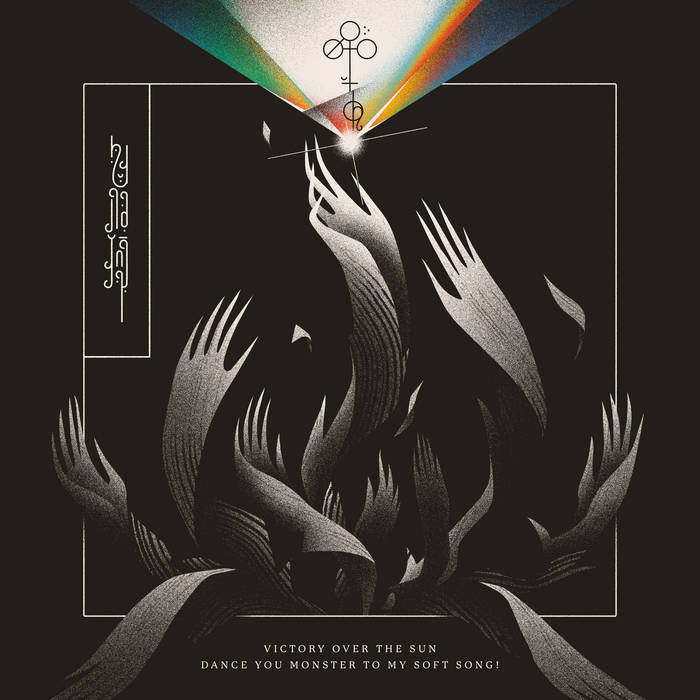It’s April 2020, and as you’re idly scrolling through Twitter, a viral clip catches your eye. In the video, a glamorous woman in a ’50s-style dress looks into the camera, and proceeds to play a series of the most mind-bending riffs imaginable, in a tuning you’ve never even heard before.
Titled “POV: 1950s housewife shows you her microtonal riffs,” it’s a knowingly subversive wink, which the artist admits in our interview: “I think that cognitive dissonance is fun. You don’t expect the heavy music when you see the girl in a dress with a guitar.”
These are the dualities of Vivian Tylinska, a.k.a. one-woman avant-garde metal act Victory Over the Sun. Recording out of her home in Portland, Oregon, Tylinska has been crafting increasingly elaborate genre-bending opuses since 2016. Alongside artists like Liturgy, Black Dresses and Uboa, she’s become part of an increasing wave of oft-queer and trans musicians reshaping metal, noise and dissonance into their own image, in defiance of the genre’s conventions.
Her fifth album, Dance You Monster to My Soft Song!, has already become one of the buzziest underground metal releases of the year. Tylinska sums it up as “both more evil and more playful than anything I’ve done before—all about desire, art and the anguish of gay yearning.” Over Zoom, we speak about the beauty in musical discordance, the parallels between creativity and transition, and why seemingly so many trans women in music are drawn to noise as a form of expression.

Dance You Monster to My Soft Song! is a rollercoaster of sounds and emotions. “The Gold of Having Nothing” opens with trumpet and tenor sax spiralling upwards to heaven, but ends in the gutter, with the ugliest of death metal riffs. Three minutes into “Madeline Becoming Judy,” Tylinska gives us the album’s most thrilling melodic payoff—a bouncy synth lead and drums that wouldn’t feel out of place in an A-ha song, before descending into chromatic tone-cluster madness, and finally building back up to a sense of hope. Alongside guest musicians on wind instruments and violin, the screamed vocals, multi-tracked guitars and drums form an intricate web—all clearly the vision of one composer.
Almost every song, three of them over 10 minutes, starts and ends in a radically different place. On first listen, it can seem like there’s a grand plan, but Tylinska insists there’s not. “There are these large, constructed, architectural things that I get from these little musical fragments, that I feel like I get accidentally,” she says. “It’s about constructing this big chapel of sound, of rhythm. Brick by brick, you create this large structure, and you keep tearing it down and rebuilding it until you have a thing that makes sense.”
That sense of self-exploration through construction has always been part of Tylinska’s expression. Born in Poland, she moved to the U.S. with her parents when she was three. Though she played tuba and trombone in orchestras and spent her teenage years immersed in classical music and progressive metal like Between the Buried and Me—from which she jokes that she has “irreparable damage”—her primary interests were math and physics.
“Throughout my childhood and high school, I did a lot of K’nex. I built these huge Rube Goldberg machines,” Tylinska recalls. “I had all this energy that I put into constructing these things, and not very methodically, honestly. That translated so much to how I write music! I create these big, complicated things that are kind of slapped together.
“A lot of how I create music comes from having done that for 15 years—having wanted to be a mathematician, physicist or an engineer, having pursued that very strongly up to through the end of college. And then abandoning that completely, and really just focusing on music.”
In 2016, the beginnings of Tylinska’s transition also came with her first true musical project—Cichy Duch, Polish for “silent spirit.” That became Victory Over the Sun, named for a Russian Futurist opera first performed in 1913, to an audience that “reacted violently to [its] chaos.” Like her own music, the opera comes from a radical artistic movement that many would consider strange and abstract, but can embody deeply felt emotions for those willing to go on the journey.
Tylinska first explored transness as a theme on 2020’s A Tessitura of Transfiguration, her third album, and the moment when she was clearly becoming a master of her craft. “Tessitura was really me reflecting, who am I? What does it mean to be trans? How did it feel to me when I realised that?” she says.
“My gender identity and being trans has felt very central to what Victory Over the Sun means to me,” she says. Artistic and personal self-discovery go hand in hand. As she explains, it’s about “wanting to construct not just a public image of myself, how I want to be perceived, how I want my body to look, etc… Even if [the music’s] not all about being trans, that informs so much of the way that I relate to the world and to music in a deeper way, I suppose, than I can consciously grasp.”
On Dance You Monster to My Soft Song!, Tylinska’s looking outward too. “I had the idea of desire, about the inherent unattainability of the thing you want… It’s such a fundamental part of being a woman, a transgender woman, to want this thing that is intangible; you can’t say that you have it, you can only reach towards it.”
On the album’s 16-minute opener “Thorn Woos the Wound,” Tylinska explores the way desire creates transformation. Though she describes her lyrics as “a blank canvas that conjures up these bigger ideas and emotions, and that the listener can ideally construct their own meaning [onto them],” they have a powerful, yet elusive impact—more like poetry than extreme metal lyrics. On the track she screams,
If the reaching arm could only sprout feathers, her eyes entombed by the burning nothing
Your rose-hearted, faceless truth and your mouth, the begged-for hanging sword
She would cast herself in your image.
There has perhaps never been a song as darkly romantic as “WHEEL,” paired with such brutal delivery. To get the song’s churning, swampy guitar bends, Tylinska tuned down her guitar almost an octave to F, “pushing and pulling” not the strings on the fretboard, but the neck itself. She explains, “I wanted to write the most wretched, evil, ugly thing that I could… [with] that synthy end, where there’s a little glimmer of hope.”
Over a colossal sludge-metal wall of noise, she screams,
“Desire flows out of my mouth
The shadow of my kiss stains the pavement with blossom
I always wanted to submit to function
I always wanted to become a wheel!”
Love becomes a transcendent, terrifying, obliterating force.
The power of Victory Over the Sun is that it can be a vessel for seemingly anything. There can be terror in the quiet, or joy in sonic punishment. “The majority of the art I really love is harsh and unpleasant,” Tylinska explains. “But there’s an ecstasy and a release in this horrible feeling that you can tap into. I don’t think pleasure should be the guiding light [of art]. It can be! I also enjoy music that feels good. I want both of those things to be there, and I don’t think it has to be one or the other.”
“More than ever, I’m writing for myself. And I’m very glad that other people like it too. I make music that I think is fun.”
But what draws her, and by extension so many other transfemme artists and listeners to dissonance? SOPHIE, Arca, Liturgy—there are enough that it’s even become a meme. “I feel like it’s somehow a very natural pairing,” she says. “Dissonance is all about contrast. You have this expectation that a sound should be concordant, that it should fit neatly into what you might expect to hear. And when you turn that on its side, you get this sound that you wouldn’t expect, that you don’t know how to describe.”
“I feel like that reflects how a lot of us feel. There’s this dissonance between how we feel and how we want to be felt in the world, how we see ourselves versus how we’re perceived.”
The closing track, “Black Heralds,” is perhaps the single most harrowing Victory Over the Sun composition. Adapting stanzas by the Peruvian poet César Vallejo, Tylinska ends the album by screaming, unaccompanied, her voice cracking, “There are blows in life, so formidable… I don’t know!”
Dance You Monster to My Soft Song! comes at a time where trans rights are increasingly under attack, especially in the U.S. Although direct political action and support from within and outside the trans community are the core pillars of the fight, art that tells our stories is no less vital. To exist as a trans person in the world, to make art that other people will hear, is an inherently optimistic act.
What would true trans liberation look like? Is there even an answer? For Tylinska, the response is deeply personal. “I feel so enmeshed in the suffering and the constant everyday horror of hearing the new bills that are happening. On Twitter, I try and avoid it—you can’t avoid the constant hatred. I want to look beyond that.”
“What if trans people were just treated equally, and people stopped being evil about it? What if it was normal? But I can’t put myself there because I can’t put myself into a better world, unfortunately. I’m just living in this one. I’m fighting through this one.”


 Why you can trust Xtra
Why you can trust Xtra


